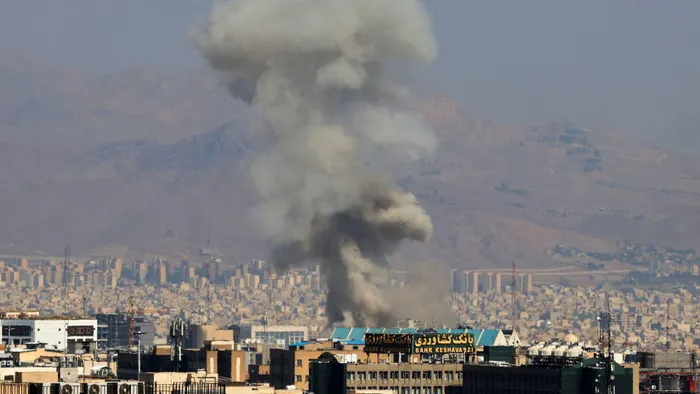Middle East tensions risk pausing South Africa’s interest rate cuts on escalating oil prices
GEOPOLITICS

Smoke billows following an explosion in central Tehran on June 15, 2025.
Image: Atta Kenare / AFP
The resurging war in the Middle East may force the South African Reserve Bank (Sarb) to put interest rates cut on pause in July as the escalation of oil prices to a three-month high may affect both global and domestic inflation outlooks.
This comes as the Sarb last month reduced the policy rate by 25 basis points to 7.25% per annum, and the prime lending rate to 10.75% per annum, and revised down its inflation forecasts as consumer prices remained below the lower band of the 3-6% target range, currently at 2.8%.
The Sarb said this reflected the lower starting point, as well as a stronger exchange rate assumption and lower world oil prices, adding that these factors offset pressure on fuel costs from the higher fuel levy announced in the Budget.
However, a further rate cuts by another 25 basis points to 7% in July risks not materialising now as the surge and persistent elevation of oil prices could sway inflation to another direction.
Brent crude oil prices spiked as much as 13% on Friday, topping $78 a barrel intraday, before settling near $75 a barrel on Monday, its highest level since 3 April, after Israel and Iran broadened strikes against each other, heightening fears that escalating tensions could disrupt crude supplies from the Middle East.
Israel launched a significant air attack on Iranian nuclear and military facilities early Friday morning, causing equity and currency markets to crash while gold and oil prices surged.
A key concern is potential disruption to the Strait of Hormuz, a critical chokepoint through which about 18–19 million barrels per day, or roughly 20% of global oil consumption, passes.
Brent crude surged after Israel launched an attack on the giant South Pars gas field in the Persian Gulf over the weekend, forcing the halt of a production platform, following airstrikes on Iran’s nuclear facilities and military leadership last week.
“The move erased year-to-date losses and revived concerns about global energy supplies,” said Wichard Cilliers, director and head of market risk at TreasuryONE.
“While OPEC+ has spare capacity to offset potential supply disruptions, analysts cautioned that retaliation by Tehran could complicate the situation. The International Energy Agency said it stands ready to release emergency stockpiles if necessary.”
While direct supply impacts have been limited so far, geopolitical risks remain elevated.
Nigel Green, CEO of independent financial advisory deVere Group, said Israel’s recent counterstrikes mark a significant intensification, targeting infrastructure inside Iran—a move seen by many as a shift away from proxy warfare and toward direct State conflict.
Green said the risks to global energy markets were growing, adding that even the threat of closure or interference would “likely push oil well beyond $100 per barrel, reigniting inflation and altering the current trajectory of interest rate policy in developed economies.”
“Investors are clinging to a framework shaped by central bank support, solid earnings, and disinflation. But if energy prices rise sharply from here, that disinflation story evaporates. Rate cuts could stall. Market momentum could reverse,” Green said.
“The view that markets can power through every shock is no longer supported by the data. The conflict in the Middle East has entered a more dangerous phase. It has serious global and far-reaching implications for investors.”
The escalating tensions in the Middle East come as the markets will closely watch this week’s Federal Reserve (Fed) meeting and rate decision.
Signals for the Fed’s near-term policy stance currently point to a 25 basis point cut in September.
“The Federal Reserve is expected to hold its interest rate steady at 4.5%, and the post-meeting press conference will be closely scrutinised for hints on the timing of the likely interest rate reduction,” said Nedbank economist, Busisiwe Nkonki.
“President [Donald] Trump has publicly pressured the Fed to cut interest rates. At the same time, Fed Chair [Jerome] Powell has repeatedly indicated that the Fed will wait until the likely impact of the higher import tariffs is clearer. Most economists foresee potential rate cuts beginning in September. Other countries like China, the UK, Japan, and Brazil will likely keep their interest rates unchanged.”
BUSINESS REPORT